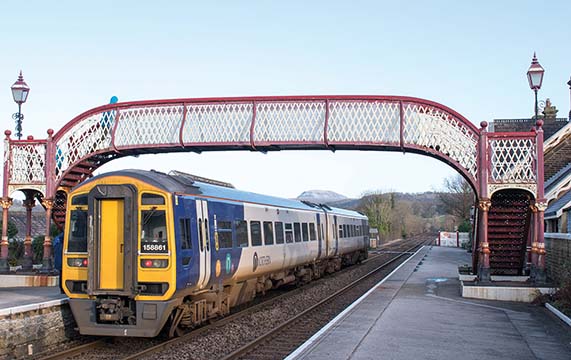
(what shall I do? I want a ticket to Birmingham, but I can’t buy one from you!)

It’s quite difficult to do a U-turn on a railway track, but the government seems to have managed it with their controversial plan to close the majority of railway station ticket offices, before then completely scrapping the idea in the face of public protest.
In the process they have further upset staff at a time of already strained industrial relations, and hacked off a lot of hard pressed railway managers who were pushed into producing proposals that they knew would be unpopular and difficult, and who were then left holding the baby when the politicians pulled the rug from under.
Understandably the chorus of complaint was particularly loud in Settle, it being a tourist destination and one where the station has extreme difficulty, due to its siting, in providing safe and easy access to the down platform for the less mobile. On both these issues the friendly assistance from our regular station staff is particularly appreciated.
Yet similar proposals regarding the actual ticket offices went through on London Underground (though admittedly there is usually still a staff presence somewhere on each station) in the face of protest, and civilisation as we know it has not yet collapsed! And on many railway networks in mainland Europe, station staff, at least in the traditional ticket office role, are a scarce breed.
Even older generations are becoming increasingly savvy about buying tickets online – and the station machines are getting steadily more versatile and user-friendly. I can’t help noting that my old home station down in Sussex, though having a higher footfall than Settle, was only staffed in the morning and even then many travellers preferred to use the ticket machine rather than queue at the window.
So I was not one of those out signing the petitions, because as an ex-railwayman myself I know that we have tricky times ahead in ensuring a positive future for the rail network, and change must be embraced if we are to go forward.
Covid has left us with difficult legacies; although long distance leisure traffic has recovered well since the pandemic, business travel and commuting less so, leaving multi-million pound holes in budgets, just when inflation (and not just in wages) is driving up cost. At the same time covid restrictions brought training programmes to a halt and encouraged early retirements, all contributing, along with the current overtime bans and strikes, to services being cancelled due to lack of available traincrew. And quite apart from expense, the demographics of our ageing population mean that the suitable workforce pool is shrinking, so we need anyway to find ways of making rail operations less labour intensive.
Meanwhile the increase in weather-related infrastructure problems, almost certainly due to climate change, is evidenced by costly flooding, landslips and damage from stormy winds. Our Victorian forebears, excellent as they were in many aspects of engineering, didn’t understand soil mechanics so well; as a result, many cuttings and embankments were built with steeper sides than you would see on a new road or rail project today. So when we get sustained and torrential downpours, earth slips and rockfalls become all too probable. Piling, soil reinforcement by ‘stitching’, and netting of cutting sides are all possible mitigations, but come at a price.
There are no easy answers. Trade union rhetoric about ‘protecting jobs’ and tabloid newspaper outrage about alleged inconvenience to passengers when staffing changes are proposed, will not square the circle when costs exceed income, and we cannot expect the railways to get limitless subsidy when there are many other worthy calls on the public purse. Having served until recently as a school governor I am particularly aware of the financial pressures on education, especially in rural areas. As my old boss used to say, ‘You can’t have the penny and the bun’; choices will have to be made and priorities set.
So I can’t give you any simple solutions, just a plea for people to be more constructive about how we can secure an affordable future for our rail services. And with a general election coming ahead, pressure your politicians to take the holistic view, to avoid knee-jerk reactions when finance is tight and to be open and honest with staff and passengers about the options. Push especially for improved reliability, and coherent timetable patterns, for these are the things that will attract people and sell tickets (whatever the actual means of sale) and thereby generate income.
Meanwhile please do use your trains (and buses), not just from Settle but on the Bentham line and beyond as well, and treat public transport as an attractive alternative to sitting in a jam on the motorway and grumbling about car parking!
By Phillip Hinde



